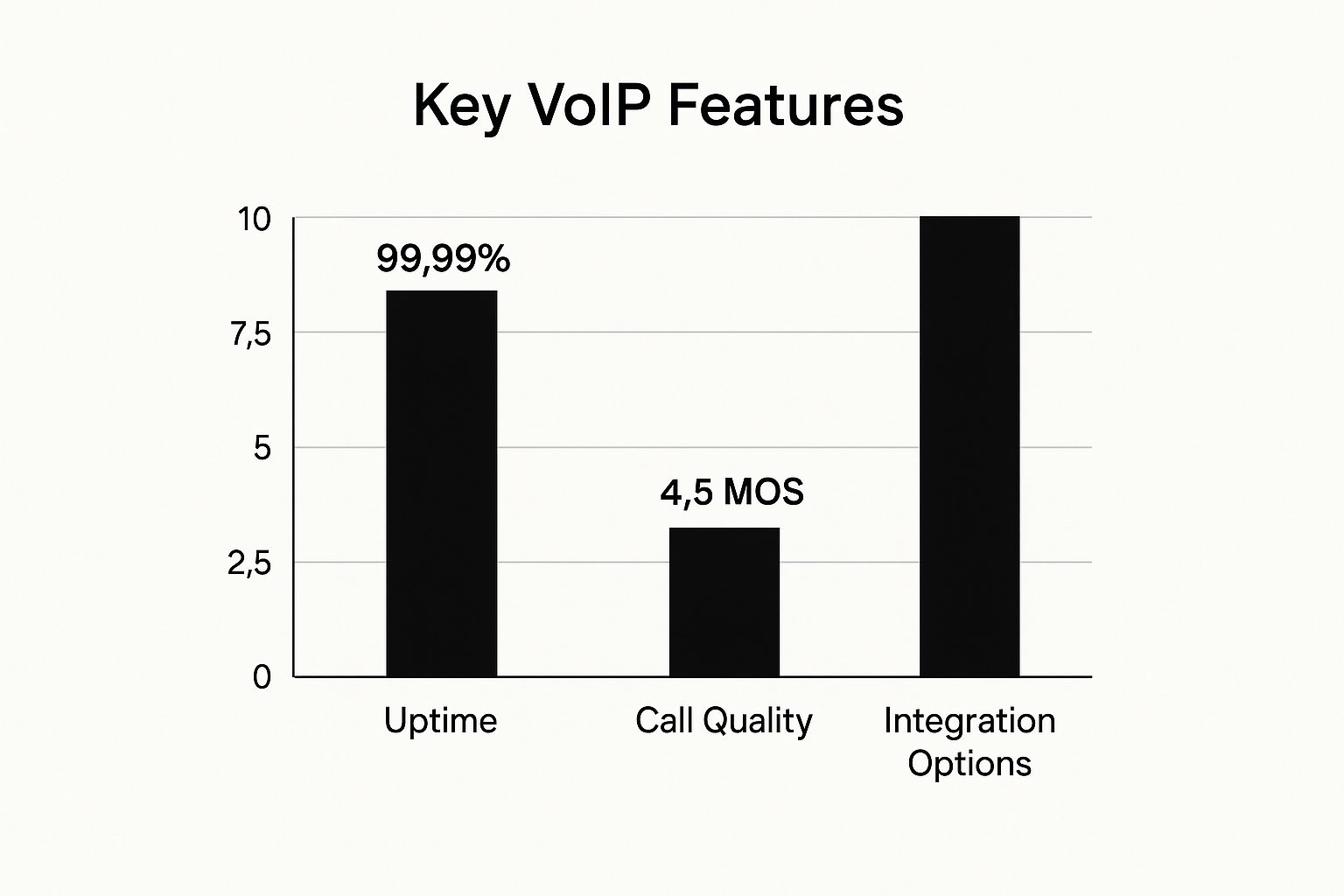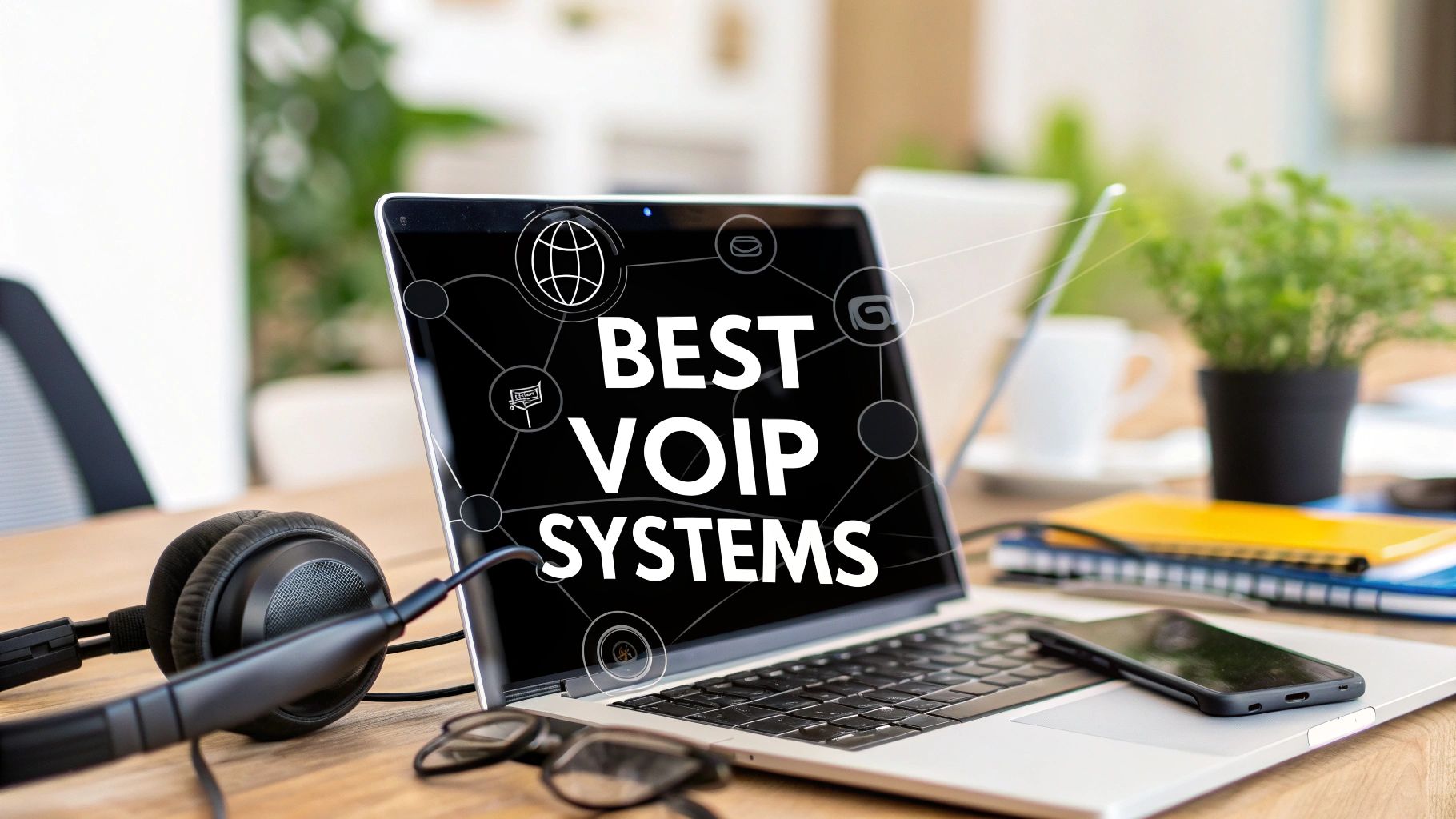When you start looking for the best VoIP phone systems for small business, you'll quickly see a few names pop up again and again: Nextiva, RingCentral, and Ooma. These providers have earned their reputations by offering solid features, plans that grow with you, and dependable service. They're at the forefront of helping businesses like yours ditch outdated landlines for a more flexible, internet-based phone solution.
Why VoIP Is a Game-Changer for Small Business
If you’re still dealing with a clunky, expensive traditional phone system, you know the frustration. Many small businesses feel trapped by the high costs and physical chains of landlines, which were never built for the way we work today. Legacy systems mean bulky hardware in a closet, zero support for remote employees, and rigid, expensive contracts.
This is exactly where Voice over Internet Protocol (VoIP) comes in to save the day. To really get why VoIP is such a big deal, it helps to understand the basic Voice Over Internet Protocol (VoIP) meaning. Instead of using old-school copper wires, VoIP sends your calls over the internet connection you already have. This simple change opens up a whole new world of advanced features and serious cost savings.
And this isn't just some niche tech trend. The global VoIP market is expected to hit a massive USD 161.79 billion by 2025, with businesses accounting for 78.7% of that usage. You can find more details on the growing VoIP market on electroiq.com.
Key Advantages for Modern Businesses
For a small business, switching to VoIP brings practical benefits you'll notice right away. It's not just a new phone system; it's a tool that helps you operate smarter and grow faster.
- Look More Professional: Features like an auto-attendant ("Press 1 for Sales, Press 2 for Support") and custom hold music instantly give your small shop the polished feel of a much larger company.
- Work from Anywhere: A VoIP mobile app means your business phone number is always with you. Your team can take and make calls from their personal smartphones or laptops, whether they're at home or on the road. You’ll never miss an important call again.
- Save a Ton of Money: VoIP gets rid of costly landline contracts and slashes international calling fees. It’s common for businesses to see their monthly phone bills drop by over 40%.
- Scale with Ease: Need to add a new team member? It's as simple as adding a new user in your online dashboard. No more waiting for a technician to come out and install another physical phone line.
Evaluating Features That Actually Matter to Your Business

When you start digging into the best VoIP phone systems for a small business, you’re going to be hit with a wall of features. It’s easy to get lost in the technical jargon, but the real goal is to zero in on the functions that will genuinely improve how you work every day. Forget chasing every last bell and whistle; let’s figure out what truly moves the needle.
A fantastic place to start is the auto-attendant, which you might know as a virtual receptionist. This is the feature that automatically greets callers and guides them to the right place ("Press 1 for Sales…"). It immediately gives your business a polished, professional feel and makes sure no call gets dropped—a lifesaver when you're a small team wearing multiple hats.
Next up is advanced call routing. This is much more than basic call forwarding. A modern system can direct incoming calls based on the time of day, who's available, or even the caller's history with your company. For instance, you could send after-hours calls straight to voicemail but route calls during business hours to a ring group of available agents.
Core Functions for Operational Efficiency
To really streamline your workflow, some features are simply non-negotiable. They save time, cut down on manual tasks, and help you grab opportunities you might otherwise miss.
- Mobile App Functionality: If your team is ever out of the office, a solid mobile app is a must. It essentially turns any smartphone into a business line, letting your staff make and take calls from the company number. This keeps things professional and protects everyone's personal privacy.
- Voicemail-to-Email Transcription: This is a game-changer. It takes voice messages, converts them to text, and pops them right into your email inbox. You can quickly scan messages to see what's urgent without listening to every single one, helping you get back to important leads much faster.
- CRM Integration: Connecting your phone system to your Customer Relationship Management (CRM) software gives you a massive advantage. It can automatically log every call, pull up a customer's details the moment they ring, and feed valuable data back to your sales and support teams.
"A feature is only valuable if it solves a real problem. For a small business, that often means improving customer perception, increasing team flexibility, or automating a repetitive task that drains valuable time."
Differentiating Essentials from Add-Ons
As you compare different providers, start sorting features into two buckets: "must-haves" and "nice-to-haves." This will look different for every business. A landscaping company, for example, will probably prioritize a top-notch mobile app above everything else. A small e-commerce shop, on the other hand, might find call analytics and CRM integration more critical for tracking customer interactions.
At the end of the day, the right system isn't just about the technology itself—it's about finding a solution that actively supports your business goals. It's a lot like building a technology roadmap; you have to understand what you need first. For more on this strategic thinking, check out our guide on how to choose the best managed IT service plan. This approach ensures you're not just buying a tool, but investing in something that will help you grow.
Comparing The Top Small Business VoIP Providers
Picking the right VoIP provider means looking past the flashy feature lists. The best VoIP phone systems for small business aren't a one-size-fits-all solution; each one is built to solve a different kind of problem. Instead of a generic rundown, we're going to dig into the leading providers from the perspective of real business needs, focusing on pricing, usability, and where each one truly stands out.
It's no secret the VoIP industry is booming, largely because it offers so much flexibility and savings over old-school phone lines. The global market was valued at a staggering USD 151.21 billion in 2024 and is on track to hit USD 236.25 billion by 2028. Small and medium-sized businesses are a huge part of this, projected to drive more than 15% market growth by 2025 alone. You can find more details about this expanding market on zoom.com.
H3: Nextiva: The Best All-Around Performer
Nextiva consistently gets high praise because it’s both powerful and genuinely easy to use. It hits that sweet spot between having a ton of features and providing an interface that doesn't require an IT degree to figure out. For most businesses that just need a robust system to work without constant tinkering, this is a fantastic choice.
Everything is packed into their NextOS platform—voice, video, and team chat all live in one application. This unified setup is a huge win for productivity, as your team isn't constantly jumping between different tools to communicate.
If you're making the switch from a traditional landline, Nextiva’s setup process and customer support are a lifesaver. They provide excellent onboarding to make sure your transition is as smooth as possible.
H3: RingCentral: The Top Choice For Scalability
RingCentral is a true powerhouse, built for businesses with big growth plans. While it works perfectly well for small teams, its real strength is in its ability to scale and connect with almost any other tool you use. If you envision expanding your team or need your phone system to talk to your other business software, put RingCentral at the top of your list.
It seamlessly integrates with hundreds of popular apps like Salesforce, Microsoft 365, and Google Workspace. This opens the door for some seriously advanced workflows, like having calls automatically logged in your CRM or launching a video meeting straight from a team message.
RingCentral is built for complexity. It’s the go-to solution when you need your phone system to do more than just make calls—it needs to become a central hub for all your business communications.
While its deep feature set might feel like a bit much for a solo operator, it gives a growing business the foundation it needs to add new capabilities over time without having to start over with a new provider.
H3: Ooma Office: The Value Leader For Simplicity
Ooma Office has carved out its space by offering a straightforward, no-nonsense VoIP solution that’s incredibly simple to set up and manage. For small businesses that care more about reliability and core calling features than complex integrations, Ooma delivers serious value.
It's a genuine plug-and-play system. Most offices can get up and running in under an hour without needing any special technical help. That simplicity is its biggest selling point.
This chart breaks down the critical benchmarks—Uptime, Call Quality, and Integration Options—that you should be looking at when comparing providers.

As you can see, while all the top players promise excellent uptime and quality, the level of integration is often what sets them apart.
For businesses that don't need their phone system to connect to a dozen other apps, Ooma's clear pricing and essential features—like a virtual receptionist and a mobile app—give you everything you need for a professional image.
To help you see how these providers compare head-to-head, here’s a quick breakdown of where each one shines for small businesses.
Feature and Pricing Comparison of Leading VoIP Providers
| Provider | Starting Price (Per User/Month) | Key Features | Best For |
|---|---|---|---|
| Nextiva | ~$21 | All-in-one app (voice, video, chat), CRM, call analytics | Businesses wanting a powerful, easy-to-use system with excellent support. |
| RingCentral | ~$20 | 300+ integrations, advanced call routing, team messaging | Growing teams that need a scalable platform with deep software connectivity. |
| Ooma Office | ~$19.95 | Virtual receptionist, mobile app, easy setup, no contracts | Startups and small businesses seeking a simple, reliable, and affordable phone system. |
| Grasshopper | ~$14 | Virtual phone number, works on existing cell phones | Solopreneurs and micro-businesses that need a professional number without new hardware. |
Ultimately, choosing the right system comes down to how your business actually works. A fully remote company will prioritize very different features than a brick-and-mortar retail shop. The trick is to align the provider’s strengths with your day-to-day needs and your goals for the future. Handling this kind of technology is a core part of any business strategy today; you can learn more about why managed IT services are perfect for small businesses in our related guide.
Calculating the True Cost of a VoIP System

When you're shopping for the best voip phone systems for small business, the monthly per-user price is what catches your eye. But that number is just the tip of the iceberg. To really understand what you'll be spending, you need to look at the total cost of ownership (TCO), which covers everything from setup fees to the long-term operational value you get back.
Most providers hook you with a low base rate, but that price can quickly inflate once you add the features you actually need or get hit with one-time charges. Doing a full cost analysis upfront saves you from sticker shock later and helps you compare providers honestly.
Uncovering Potential Hidden Costs
Before you sign on the dotted line, it's time to play detective. Look past the advertised monthly fee and ask pointed questions about any and all charges that could find their way onto your bill. This is the only way to get a complete picture of your investment.
Be sure to ask about these common costs:
- Hardware Purchases: Do you need new IP phones or headsets? Some providers let you rent hardware, which can be great for cash flow, while others make you buy it all upfront.
- Number Porting Fees: There's usually a one-time charge to bring your existing business phone number over to the new service.
- Taxes and Regulatory Fees: These are almost never included in the advertised price and can add a significant chunk to your monthly bill.
- Premium Feature Add-Ons: Need advanced call analytics, CRM integrations, or call recording? Those powerful tools often mean upgrading to a pricier plan or paying for them à la carte.
"The true value of a VoIP system isn't just about what you spend, but what you save. The ROI comes from slashed landline bills, enhanced team productivity, and the ability to serve customers more effectively, no matter where your team works."
The Other Side of the Equation: Return on Investment
Figuring out the cost is only half the battle. The real magic of VoIP is the return on investment you get. The savings kick in almost immediately, starting with ditching those expensive, inflexible landline contracts and watching your calling costs plummet.
How much can you save? Small businesses often see their local call costs drop by an average of 40%, and international calls can be up to 90% cheaper. Since VoIP runs on the internet connection you already have, the initial setup can be up to 90% less than a traditional phone system.
These savings are just the beginning. You also get huge productivity boosts from features like smart call routing, which is a major draw for 57% of small business users. You can dig into more of these impactful VoIP statistics at globaltechstack.com. For a small team trying to punch above its weight, that kind of efficiency is priceless.
Your Guide to a Smooth VoIP Implementation

Picking the right VoIP phone system is a big win for your small business, but the real test is getting it up and running without a hitch. A truly successful switch means your team and your customers barely notice a change—except for the better call quality and new features, of course.
The secret to a smooth rollout isn't just about the phone system itself. It starts with a hard look at your current network. I've seen it time and time again: businesses blame their new VoIP provider for bad call quality when the real culprit is a weak or congested internet connection. Your calls are only as good as the network they run on.
Pre-Launch Preparation Checklist
Before you even think about moving phone numbers over, it pays to run through a quick checklist. Getting these ducks in a row now will save you a world of headaches later and prevent disruptions to your business.
- Assess Network Readiness: Don't just run a speed test on a quiet morning. Test your connection during your busiest hours. You need to know if you have enough upload and download bandwidth to handle the number of simultaneous calls your team makes when things are really humming.
- Evaluate Your Hardware: Take a look at your routers and switches. Are they modern enough to handle Quality of Service (QoS) and prioritize voice traffic? Old gear can be a bottleneck, leading to that dreaded jitter and dropped calls. You might need an upgrade.
- Plan Your Number Porting: Moving your existing phone number to a new service isn't instant. It can take a few days or even a couple of weeks. Talk to your new provider and schedule the porting process carefully to ensure there’s zero downtime for your main business line.
- Configure Your Call Flows: This is crucial. Map out exactly what happens when a customer calls. Who does the auto-attendant greet? Where do calls go after hours or on holidays? Getting this logic set up beforehand means you're ready to go from the moment you flip the switch.
A well-planned implementation is less about tech and more about business continuity. The best VoIP providers really shine here, offering dedicated support to help you sort out settings and network kinks. They turn a potentially complex process into a manageable one.
Navigating the Setup Process
With your network prepped and ready, the actual setup is usually pretty straightforward. Most top-tier VoIP systems are built for self-service, but this is where a provider's customer support really shows its value. They should be right there with you, ready to help configure your auto-attendant, set up user extensions, and get the mobile and desktop apps installed.
For a more granular, step-by-step look at the technical side, our guide on VoIP phone system installation is a great resource. By getting your network in order and leaning on your provider’s know-how, you can make a confident switch to a phone system that helps your business run better.
Common Questions About Switching to VoIP
Deciding to switch your business phone system is a big move, and it's totally normal to have a few questions. When you're looking at the best VoIP phone systems for a small business, getting straight answers is key to feeling good about your choice. Let's dig into some of the most frequent things business owners ask before they make the jump.
"Can I keep my current business phone number?" This is probably the biggest worry we hear, and the answer is almost always yes. The process is called number porting, and any quality VoIP provider will handle it for you. They’ll move your existing landline or mobile number right over to their system, so there's no disruption for your customers.
"Do I have to buy all new phones?" Not unless you want to. While shiny new IP desk phones are great, they aren't a requirement. Most modern VoIP services come with fantastic desktop and mobile apps—often called "softphones." These apps turn your computer or smartphone into a full-featured business phone, letting your team stay connected with the company number from literally anywhere.
Is the Call Quality as Good as a Landline?
This is a make-or-break question for any business. Back in the day, VoIP could be a bit sketchy, but that’s ancient history now. Modern systems deliver HD voice quality that is often noticeably clearer and richer than what you get from an old analog landline.
The secret ingredient? Your internet connection. If you have a stable, solid internet service, your calls will be rock-solid. The technology is smart enough to prioritize the voice data from your calls, which helps eliminate the jitter and dropped calls that people used to worry about.
A lot of people think VoIP is less secure than a traditional phone line, but the opposite is often true. Top providers use powerful encryption standards like TLS and SRTP to shield your conversations from eavesdroppers, making it an incredibly secure way to communicate.
How Secure Is VoIP for Business Communication?
Security is non-negotiable, and this is where professional VoIP services really shine. Old-school landlines can be tapped physically, but VoIP calls are digital. They're converted into encrypted data packets the moment you start talking.
Think of it like scrambling your conversation so only the person you're talking to can unscramble it. Reputable providers layer on even more security to protect their networks from threats, keeping your sensitive business discussions private. When you choose a quality VoIP service, you’re not just getting better features—you're getting a fundamentally more secure communication platform.
A great VoIP system is only as good as the network it runs on. Clouddle Inc offers managed Network-as-a-Service solutions designed to keep your connection perfectly tuned for crystal-clear calls and flawless performance. Learn how Clouddle can build the perfect network for your business communications.


